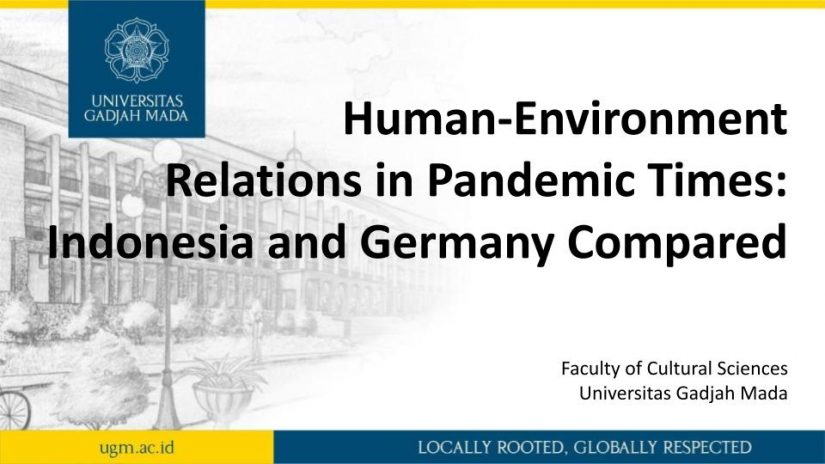
Course Title : Human-Environment Relations in Pandemic Times: Indonesia and Germany Compared
Course degree : Undergraduate and Master Degree
Faculty : Cultural Sciences
Study Program : Anthropology
Number of Credits : 3 credits
Class coordinator : Prof. Dr. Pujo Semedi Hargo Yuwono, M.A. (Mr.)
About this course
This seminar will deal with current human-environment relationships and, in particular, ask about changes and its reinterpretations under pandemic conditions. In the seminar we will first get an overview of basic literature – especially in the areas of Environmental Anthropology, Political Ecology and Planetary Health – and then prepare and carry out small empirical projects. These can, for example, focus on the human-animal relationship, human-garbage, spiritual cosmologies, understanding of healing or environmental activism. The seminar sessions are partly carried out digitally, together with anthropology students from Gadjah Mada University in Yogyakarta (this is why there are occasionally three-hour sessions in English, to compensate for cancellation in other weeks, so that we have a total of two semester hours).
Syllabus
| No | Topics | Instructor | Duration (Hours) |
| 1 | Human-animal relations in pandemic times, Cultural animal studies; Multispecies anthropology: wild and domesticated animals; livestock, birds, pets, meat (food industry, religious/cultural rules), “extreme food” (consumption of wild animals); sacrifice (animals as mediators to spirits/anchestors) | -Prof. Judith Schlehe
-Prof. Dr. Pujo Semedi Hargo Yuwono, M.A. |
21 Oct (3 hours)
9-12: 2 hours digital, 9-11: German students additionally one hour in presence 11-12: Introduction, organization, creation of teams for fieldwork exercises 28 Oct (2 hours, 10-12, digital) Conversation: Indonesian and German students tell each other (in app. 3 min.) what they know and think of human environment relations in their countries (personal experiences, perspectives, cultural/political context). Feel free to share your thoughts and/or show us your environment or things, plants, animals you feel related with. We expect from this session to get to know each other and to understand each other’s background better. |
| 04 Nov (3 hours)
9-12: 2 hours digital. 9-11: German students additionally one hour in presence. 11-12: Mandatory literature for all Discussion: 1. Großmann (2022): 13-34; Neilson (2018). All participants have to prepare a summary/reflection paper (250 words) until 29 October. 2. Students give a brief input presentation (15 min.) (11 Nov) Only Indonesian students. (18 Nov) Only Indonesian students. In the following sessions each group should present literature related to their topic AND share their research design (joint research question, objectives, sample, methods, relation to the before- mentioned literature/theoretical framework) 25 Nov. 10-12: Human-animal relations I: Input presentation on Dzwiza 2018 (15 min.) and Group 1 presentation |
|||
| 02 Dec.
10-12: Human-animal relations II: Group 2 and 3 Presentation 06 Dec. :Lecture with Jamie Monson (via Zoom) |
|||
| 2 | Covid-19, healing and religion/spirituality. Human-plant studies. Herbs and healing in pandemic times: Jamu, traditional methods, (modern) spiritual healing. Complementary/traditional/alternative/herbal medicine | -Prof. Judith Schlehe
-Prof. Dr. Pujo Semedi Hargo Yuwono, M.A. |
09 Dec.
10-12: COVID-19, healing and religious/spiritual practices I (Input presentation on Suhadjati and group 4 presentation) 16 Dec. 10-12: COVID-19, healing and religious/spiritual practices II (Group 5 and 6 presentation) |
| 3 | Waste in pandemic times. Hierarchy of values, increase in toxic medical waste (face masks etc.), packaging, out-door leisure activity’s remnants, consumption, food waste | -Prof. Judith Schlehe
-Prof. Dr. Pujo Semedi Hargo Yuwono, M.A. |
13 Jan.
9-12 (3 hours). Waste in pandemic times (Group 7, 8, and 9 presentation) (20 Jan.) |
| 4 | Presentation of empirical findings | -Prof. Judith Schlehe
-Prof. Dr. Pujo Semedi Hargo Yuwono, M.A. |
27 Jan.
9-12 (3 hours): Last session together with the Indonesian students. Presentations of preliminary fieldwork findings (10 min. per group) 03 Feb. 10-12: Political Ecology of Indonesia and Environmental |
| Activism (Pye and Rajawali/Hollig in Stange. 2015)
10 Feb. 10-12: Closing Discussion |
How to Apply
- We limit the maximum number of programs you can apply to 3 courses. After you read the detail about each programs, please kindly follow the instructions of apply here
- Then, you can start applying to admission.ugm.ac.id/register
- Find the course entitled ‘GAMA-iC’ in the Student Exchange category
- [IMPORTANT] If you register and complete the document requirements to:
- 1 course, you can apply to ‘GAMA-iC Spring Semester 2022 (1 course)’
- 2 courses, you can apply to ‘GAMA-iC Spring Semester 2022 (2 courses)’
- 3 courses, you can apply to ‘GAMA-iC Spring Semester 2022 (3 courses)’
- After that, you need to fill this form to select your course
- You will receive Letter of Offer before January, 12th 2021 and you need to pay the tuition fee based on your Letter of Offer (LO)
- After we received your payment, you will receive your Letter of Acceptance (LoA)

Recent Comments